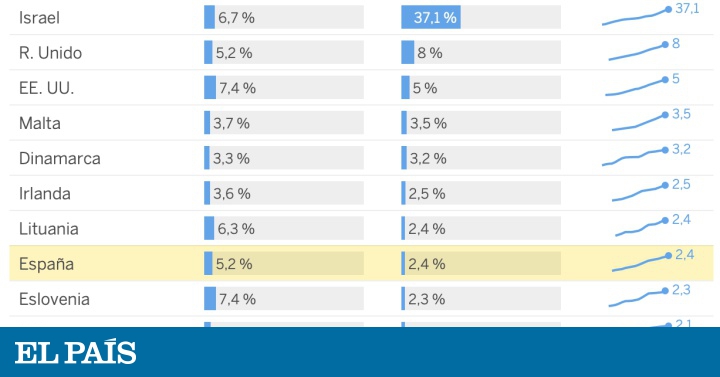Good Morning. Today I am writing you about vaccines. Of its limitations, but also of its benefits: perhaps they are better than you think.
If they send you the newsletter, sign up here
📬
Are we despising the vaccine?
This is what David Leonhardt argued this week in
The New York Times
.
He believes that media and experts have put too much emphasis on its limitations:
"
It is not 100% effective";
"vaccinated people can still be contagious";
"After you get vaccinated, everything will remain the same."
They are reasonable and well-intentioned warnings, but it seems to him that so much emphasis has overshadowed the success of vaccines.
His column has sparked a predictable discussion (the experts Leonhardt criticized are now criticizing him).
But I think a genuine debate underlies: Where is the virtuous balance between celebrating vaccines and pointing out their limitations?
Today I'm going to try that juggling act.
I start with the reasons for celebration.
🟩 1. Vaccines have developed very quickly.
As I mentioned before Christmas, hardly anyone expected to have them so quickly.
🟩 2. Vaccines are very effective.
Those of Moderna and Pfizer are 95% effective in preventing people from getting sick with covid.
And it seems that they are just as effective with severe cases: during the trials there were 34 severe patients and only one was among those vaccinated.
🟩 3. Getting vaccinated will save lives.
It is the main message.
It was for Leonhardt, who wanted to emphasize it, but also for critics of his article, such as the virologist Angela Rasmussen: "Make no mistake: these vaccines are fantastic."
The priority now is to advance vaccination.
Spain has administered doses equivalent to 2.4% of the people - assuming one per person -, which places us as one of the fastest European countries, according to data from the scientific publication OWID.
The reference is Israel, where the doses reach 38% of the population.
It is the country that everyone is looking at.
There they have just beaten a very strong third wave and, although it is true that tough measures were imposed weeks ago, it seems likely that the vaccine is also contributing.
Here you can see the data for other countries.
But this good news does not solve all the unknowns.
There are still questions about vaccines and cautions about the virus and its mutations.
🟧 It is likely that the vaccine also slows transmission, although we are not yet certain.
The effectiveness of the vaccine can have different degrees.
There is efficacy against infection (you are not infected), against transmission (you may be infected, but you do not infect) and against disease (you may be infected, perhaps you are contagious, but you do not have symptoms).
Trials have only shown the latter, so far, but vaccines are likely to offer more protection.
The most important thing was to find out if being vaccinated reduces the likelihood of you being infected.
And on that front there is good news.
Two preliminary studies in Israel indicate that vaccinated people are infected less.
There is also positive data from Moderna: when looking at patients between the first and second doses, they found that in the placebo group there were 38 asymptomatic and contagious infected, but only only 14 in the vaccinated group.
This result "suggests a degree of protection from infection and, by extension, a decrease in transmission" (I).
🟥 But we are not yet vaccinated and the virus will continue to spread if we let it.
It is the main warning.
In Spain we are immersed in a tremendous third wave, which will have to be stopped with the known recipes: masks, distance, ventilation, isolation.
We are in a race against time, which has also been made more difficult by new, more transmissible strains, such as those discovered in the United Kingdom, South Africa and Brazil.
The virus continually mutates, but now it's easier for worse mutants to emerge:
On the one hand, the virus finds more people who resist the infection because they are immunized (because they had the disease or are vaccinated), which increases the pressure to select changes that make it more sticky or elusive.
Also, the virus is more widespread and that means it rolls Darwin's dice more times.
🟥 There is fear of strains capable of escaping the vaccine, although it does not seem to be the case of those that are circulating.
The variant discovered in the United Kingdom does not, according to this study.
Nor are those from South Africa and Brazil, although they are more worrisome: “They probably have some effect on immunity, but we don't expect any of these variants, not even the British one, to affect current vaccines.
The immunity that we get with vaccines is much greater than natural immunity after an infection ”, Iñaki Comas, from the Institute of Biomedicine of Valencia (CSIC), told Manuel Ansede.
The bad new?
That the strains capable of escaping the vaccine could appear in the future.
The virus can accumulate mutations that change it to that point.
Experts agree that this can happen, although it is not known when (I, II, III).
Philip Krause, who chairs the WHO vaccine group, was concerned speaking to
Science
: “The rapid evolution of these variants suggests that it is possible for the virus to evolve to a vaccine-resistant genotype;
that can happen sooner than we would like ”.
The article author, Kai Kupferschmidt, summed up the general feeling with a "more or less soon."
🟧 The latest good news is that vaccines can be updated against strains that find ways to escape the vaccine.
We would not be in a perpetual pandemic, as the biologist Dylan Morris has explained, for two reasons: because updating vaccines is faster than developing them the first time - especially with new RNA ones - and because "immune evasion is almost always partial" .
Vaccines would not suddenly stop working, but would gradually reduce their effectiveness to the point of having to update them (as is the case with the flu vaccine).
There would be time to react.
Trevor Bedford of the Fred Hutchinson Research Center summed up the situation with a phrase that is a good example of the balance I spoke about at the beginning: “We have an amazing vaccine now that works against currently circulating viruses.
And if it ends up being necessary, [a variant of the virus that escapes it] could be faced with an update of the vaccine ”.
* * *
2. A trend graph
The temperature since 1820
The image represents the global temperature on Earth from 1820 to last year.
Each band is a year, which is painted blue if it is cold and red if it is hot.
In Datawrapper they have it interactive.
2020 tied with 2016 as the warmest on record, according to NASA, with the past seven years being the seven with the highest temperatures in the series.
“If this year is a record, it's not really that important — it's the long-term trends that matter.
Looking at those trends, and as the human impact on climate increases, we have to hope that records will continue to break. "
Can you help us?
Forward this newsletter to your contacts or tell them to sign up.
You can write me with clues or comments: kllaneras@elpais.es.









